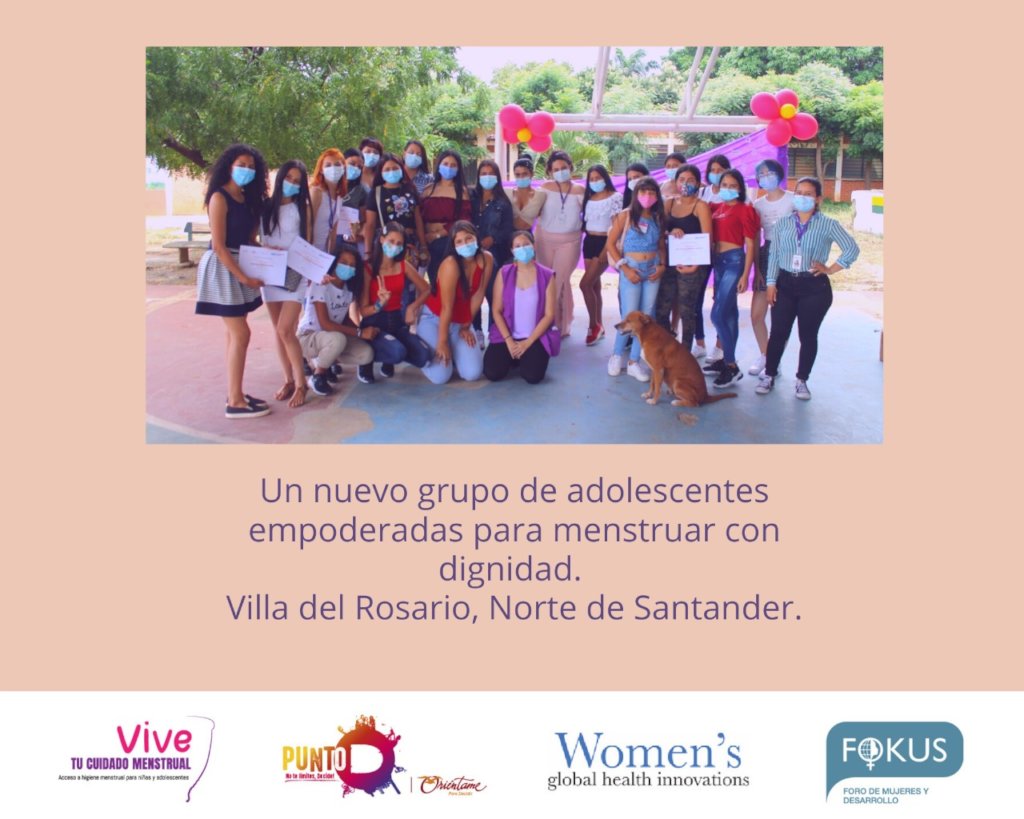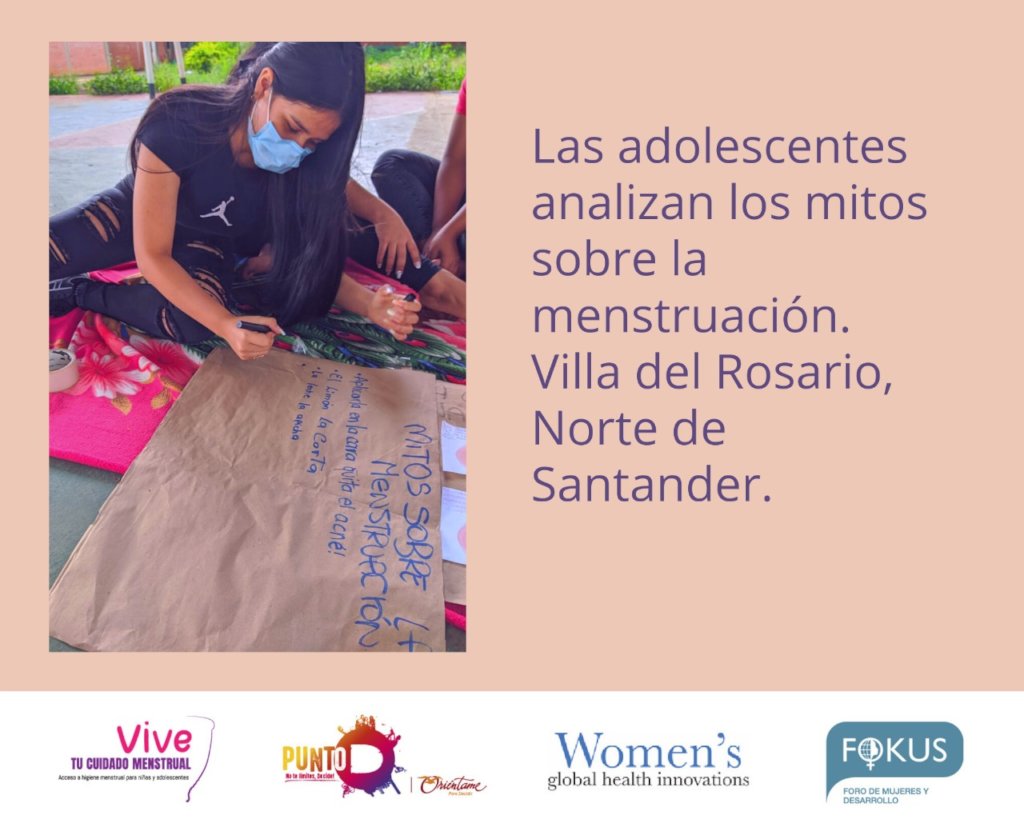By MARIA VIVAS | SECOND PHASE - Live your menstrual care
NARRATIVE REPORT FORMAT
1. GENERAL INFORMATION:
2. OBJECTIVES OF THE PROJECT:
3. ACTIVITIES CARRIED OUT:
During the period from March 19 to April 2, 2021,the planning process of the project activities was outlined and the implementation of the activities began:
3.1 Develop educational content and didactic exercises for training sessions on menstrual care, hygiene and self-care.
3.2 Invite girls and adolescents to training activities on menstrual care and hygiene, self-knowledge of the body.
It had two components:
The invitation to launch the project was widespread among different stakeholders, such as community leaders, institutional leaders and teachers, with the aim of making the course available to them and promoting it among girls.
We also directly invite girls and young people between 13 and 25 years old in Cúcuta, Villa del Rosario, Los Patios and Palenque as well as community leaders. The invitation was shared through different virtual means such as social media, email, WhatsApp and phone calls.
Invitation to register for the project:
Three WhatsApp groups were created, to share information and reminders of important dates with participants, as well as the tutorial calendar and any news related to the virtual course. The content was developed according to their age for 3 groups: the first was composed of adolescents between 13 and 15 years old; the second group consisted of adolescents between the ages of 15 and 17, and the third group consisted of women aged 18 and over.
A total of 851girls, adolescents,young people and leaders wanted to enroll in the project from different locations of Cúcuta, Villa del Rosario, Los Patios and Palenque, whose dynamics on this occasion were of two modalities: Virtual and face-to-face, the virtual course strengthened the knowledge and autonomy in the care of the body of 376 young people and in person was carried out through workshops with 441 adolescents between 13 and 25years.At the same time, 34 leaders, professionals and mothers were registered to participate in the menstrual health training cycle.
3.3 Carry out a virtual training in menstrual care and hygiene, focused on the self-knowledge of their body by girls.
Image Forum:
Virtual course image:
3.4 Prepare the general concept for the campaign and graphic pieces on the use of the menstrual cup, as well as menstrual hygiene.
Seventeen graphic pieces were designed within the framework of the virtual course, emphasizing key aspects about the use of the menstrual cup, the concept of menstrual hygiene, the menstrual cycle, menstrual products and knowledge of our body.
Graphic use of the cup piece:
Graphic piece of the menstrual cycle:
3.5 Raise awareness.
Informational capsules about menstruation were posted on social media and WhatsApp groups. Messages were also posted from participants expressing their appreciation for the course, as well as sharing a drawing of their vulva. We collect some images, highlighting your creations and your messages to your vulva.
3.6 Identify the leaders of the participating municipalities.
3.7 Develop a work plan with leaders
Image of the training cycle session:
3.8 Conduct virtual talks on menstrual hygiene, use and maintenance of the menstrual cup, myths about menstruation and the cup.
In the four sessions developed within the training cycle of coaches, topics such as the correct use of the cup, the good and bad practices of use of the cup, the myths and advantages of menstruation, the knowledge of the body, different definitions and menstruation practices in different contexts were included.
3.9 Purchase of menstrual cups.
With the support of Fokus and Women's Global Health Innovations, it was possible to purchase 800 menstrual cups of three different sizes, of very good quality and at affordable prices.
4.0 Providing menstrual cups to girls and adolescents
We mappedthe municipalities of Cúcuta, Villa del Rosario, Los Patios and Palenque to identify strategic delivery points that were close to as many participants as possible.Five community leaders were in charge of delivering menstrual cups in Villa del Rosario, los Patios, Cúcuta and Palenque.
results:
4.1 Virtual course on hygiene and menstrual care given to girls and adolescents
4.2 Menstrual hygiene awareness campaign targeting girls and adolescents
4.3. Menstrual cups given to adolescents for menstrual care.
5. EVALUATION OF THE PROGRESS OF THE PROJECT:
5,1 Main achievements
5.2 Challenges, barriers or obstacles faced and solution
Difficulties with internet connection, lack of band-with and/or mobile devices was a major obstacle to developing the virtual course and connecting to tutorials. Such connectivity issues prevented several participants from completing the course and obtaining their menstrual cup.
In times of Covid-19 pandemic, it was a challenge to conduct all synchronous sessions virtually as some topics were suitable to be held in person due to their large content. Additionally, it was not possible for adolescents who did not have internet to access the course content in person, due to the high contagion and restrictions on gatherings in public spaces. However, an attempt was made to establish communication with a close relative to convey accurate information about the virtual course.
5.3 Lessons learned
It is importan to take into account connectivity barriers for a project like this, since the attendance of the participants is something that we have less control over. This leads us to consider an additional effort to achieve participation and coverage goals.
We have learned that menstrual health management should continue to be addressed broadly, in order to provide safe and truthful information about menstruation, the advantages, and disadvantages of various menstrual products, and to emphasize knowledge of girl´s and wome´s bodies. From that knowledge, we are aware of the power we have to make decisions about it, engage in safe sex, and understand natural processes such as menstruation.
6. List in the Annex:
See list of courses enrolled and enrolleds: https://fundaorientame-my.sharepoint.com/:x:/g/personal/aguatava_orientame_org_co/Ee8j1lWvgnVJouZmpGINtDkBPcJC6qdVtZqA1KbwB5M5kg?e=yZCUwT
See list of registered leaders: https://fundaorientame-my.sharepoint.com/:x:/g/personal/aguatava_orientame_org_co/EQTKotq-1_dFijN1tTFzd0IBIWCkI4BC0KHGgT1_bqci1g?e=ABJWXh
See delivery of drinks: https://fundaorientame-my.sharepoint.com/:x:/g/personal/aguatava_orientame_org_co/ER5NWGh6niRDprhBIX0POwQBdDqFbQ6iu7KsX6jA8YX1hA?e=i653Db
View launch log: https://fundaorientame-my.sharepoint.com/:x:/g/personal/aguatava_orientame_org_co/EWu_4VtezkpMrXdCXPC1rZIBWKfmIyUijtdu02R_lVGC0A?e=laUkOL
Links:
Project reports on GlobalGiving are posted directly to globalgiving.org by Project Leaders as they are completed, generally every 3-4 months. To protect the integrity of these documents, GlobalGiving does not alter them; therefore you may find some language or formatting issues.
If you donate to this project or have donated to this project, you can receive an email when this project posts a report. You can also subscribe for reports without donating.
Support this important cause by creating a personalized fundraising page.
Start a Fundraiser
